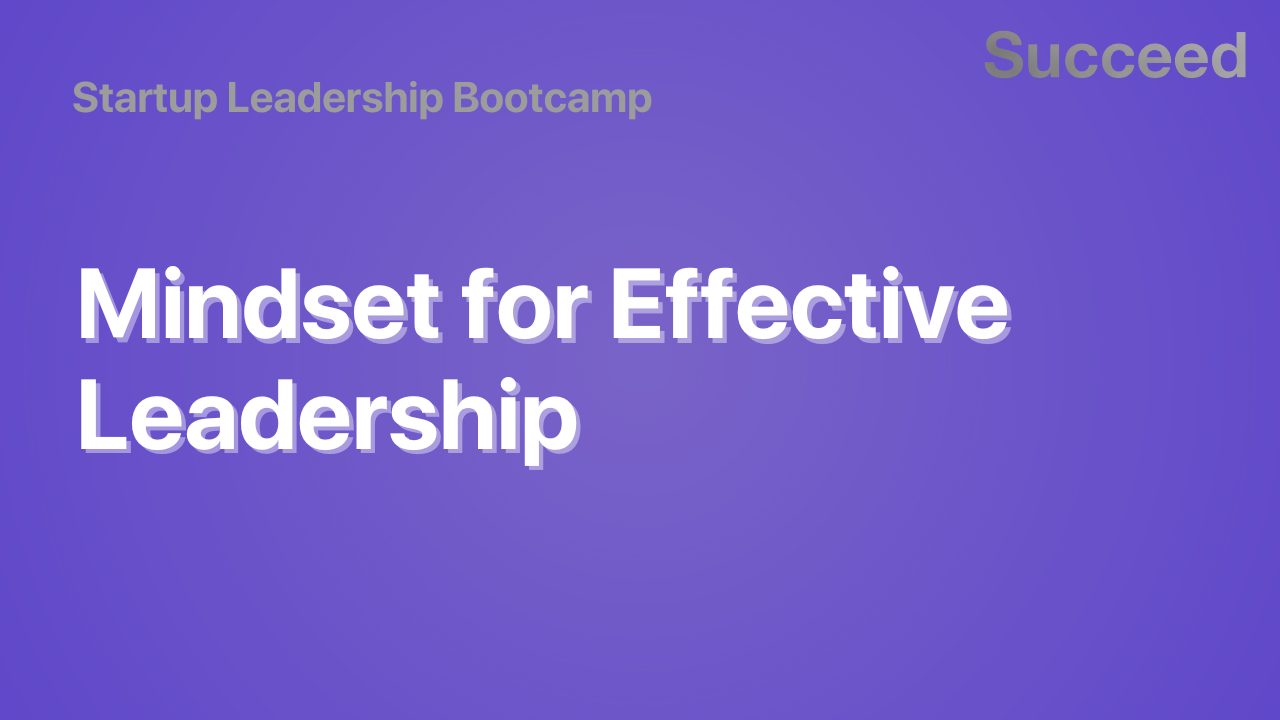01-Mindset for Effective Leadership
In the realm of leadership, mindset is everything. Jens Heitland, in his enlightening session on "Mindset for Effective Leadership," delves into the transformative power of beliefs in shaping leaders and their approach to challenges. He introduces the concept of supporting and limiting beliefs, emphasizing how our internal narratives can either propel us forward or hold us back.
Understanding Beliefs and Their Impact
Beliefs are the bedrock of our thoughts and actions. Jens explains that every leader possesses a mix of supporting beliefs, which fuel progress and growth, and limiting beliefs, which hinder potential. Recognizing this dichotomy is the first step toward a growth mindset.
The Power of Feedback and Failure
Jens highlights feedback and failure as two critical areas where beliefs play a pivotal role. Viewing feedback as an opportunity for growth rather than a threat can significantly impact a leader's development. Similarly, perceiving failure as a stepping stone rather than a setback fosters resilience and a forward-thinking attitude.
Rewiring Your Brain: Overcoming Limiting Beliefs
The journey to effective leadership involves identifying and challenging limiting beliefs. Jens proposes a 'mindset canvas' as a tool to map out personal beliefs, facilitating a deeper understanding of one's mental landscape. This self-awareness is crucial for personal growth and leadership development.
The Art of Delegation and Teamwork
Understanding your mindset also enhances teamwork. By recognizing tasks that align with your supporting beliefs and delegating those that don't, leaders can optimize team performance. This approach not only leverages individual strengths but also fosters a culture of growth and development.
Transforming Limiting Beliefs into Supportive Ones
The ultimate goal is to transform limiting beliefs into supportive ones. Jens encourages leaders to view challenges as opportunities for growth, fostering a mindset that embraces learning and development.
Conclusion: Embrace the Power of Mindset
In conclusion, Jens Heitland's insights remind us that a growth mindset is essential for effective leadership. By understanding and harnessing our beliefs, we can overcome obstacles, foster team synergy, and lead with confidence and resilience.
Transcript:
Mindset.
What I have seen for myself is that if you start with yourself, that's the most successful way how you can lead a company.
We have existing beliefs. Beliefs are things that are wired in our brain were We do things naturally, but as well, that means there are a couple of things that are supporting us and there are a couple of things that are limiting us in the way we think about ourselves.
And I will just put a couple of sticky notes in.
Supporting beliefs, you might have a supporting belief that is, I love to get feedback.
And through feedback you will grow. So some of you believe that if you get feedback that's a valuable thing and you grow, that can be as well a negative thing. If you say I fear feedback, feedback can be seen in two different ways and depending on how you are wired for yourself, feedback can be a good thing or I fear feedback because I'm seen as bad.
So you're not seeing good enough. That's correct. It straight away. So this, these are two examples. That can be of course the same with failure. If we just copy this failure. So what does it mean for failure? How do you work with failure is dragging me down and is showing me
how bad I am. Failure can as well be something which is just seen as a trigger,
the tricky thing. With me is I can't talk and type at the same time. So failure can show you as well how you can improve. So there's always two sides of the coin and you get the construct of this, just having a negotiation with yourself. What are the different things? It can be when I'm frustrated I give up.
This might be limiting beliefs. Then you can have, I stick to what I know because then I feel better. These are all limiting topics for you or on the other side is challenge helps me to grow. So you like to be challenged, you like to go into a challenge and environment and that what's helping you to grow.
So just by understanding of what are my supporting beliefs and what are my limiting beliefs will help you to rewire your brain. Because if you are aware of how you think, if you're aware of what's holding you back, then you can decide do I want to go for feedback? Even that's scary for me. Or am I just okay with Yeah, no, I don't want to get feedback.
That's why I'm not doing it. And if you're a leader, the good thing of that is if you know that is something you don't like, that is something you don't enjoy, you can delegate the things you don't enjoy to someone of your team members. And if you are a co-founding team, then you can split these things in the way that you say, Hey, this is one of the things I don't enjoy at all.
So I am very struggling with that topics. How can I learn from you? Or you put these things, let's say if you do this mindset canvas with all your co-founders, you put it on the table or even later on with all your team members and then figure out where you all are and then you delegate things to the team members, which they enjoy doing.
Where they're good at, where they know this is a supporting belief for them, or you use it as a development tool where you say, oh yeah, this is a limiting belief for me. How can I use that in developing myself? So how can I move a limiting believe from from the right side to being a supportive belief?
So there are a couple of things you can do with this. This is all about the mindset. It's a very, very simple tool and I try to keep it as simple as possible, but it's very powerful if you get into that.

